

The Moment of Truth for Cars That Talk to Each Other. The phrase “vehicle-to-vehicle communications” might currently mean little more than a few choice words hurled through an open car window.
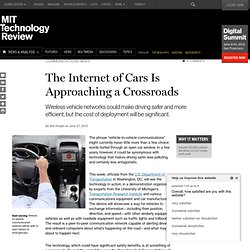
In a few years, however, it could be synonymous with technology that makes driving safer, less polluting, and certainly less antagonistic. This week, officials from the U.S. Department of Transportation in Washington, DC, will see the technology in action, in a demonstration organized by experts from the University of Michigan’s Transportation Research Institute and various communications equipment and car manufacturers.
Disruptions: Medicine That Monitors You. Google Glass : Ils inventent des lunettes pour bloquer la reconnaissance faciale. Privacy visor glasses jam facial recognition systems to protect your privacy #DigInfo. China Interbank Market Freezes As Overnight Repo Explodes To 25% China’s liquidity ‘reasonable’: PBoC. The People’s Bank of China ... the central bank says liquidity is at a “reasonable’ level and that it will maintain “prudent” monetary policy, but that this would involve some “fine tuning” at the proper time.

Photo: Bloomberg Angus Grigg AFR correspondent Shanghai | China’s central bank signalled the days of easy credit for the country’s financial institutions are over, raising concerns of a prolonged cash crunch in the second-largest economy which sent tremors across the region. As several investment banks cut their growth forecasts for China, major Chinese share indices fell more than 5 per cent on concerns that financial stocks are increasingly vulnerable to the loss of liquidity that has disrupted Chinese financial markets over the past two weeks.
AMP downgrade just the opener. How Technology Is Destroying Jobs. Pentagon bracing for public dissent over climate and energy shocks. Top secret US National Security Agency (NSA) documents disclosed by the Guardian have shocked the world with revelations of a comprehensive US-based surveillance system with direct access to Facebook, Apple, Google, Microsoft and other tech giants.

New Zealand court records suggest that data harvested by the NSA's Prism system has been fed into the Five Eyes intelligence alliance whose members also include the UK, Canada, Australia and New Zealand. But why have Western security agencies developed such an unprecedented capacity to spy on their own domestic populations? Since the 2008 economic crash, security agencies have increasingly spied on political activists, especially environmental groups, on behalf of corporate interests. How open data is transforming democracy in Africa – and the challenges it faces. Kenya is at the forefront of the open data movement in Africa thanks to initiatives such as crowdsourcing software Ushahidi and government tracker Uchaguzi.
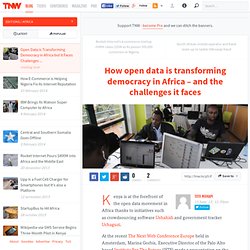
At the recent The Next Web Conference Europe held in Amsterdam, Marina Gorbis, Executive Director of the Palo Alto based Institute For The Future (IFTF) made a presentation on the “Nature Of The Future – Socialstructed World.” U.S. Supreme Court Says “Natural” Human Genes May Not Be Patented. The U.S.
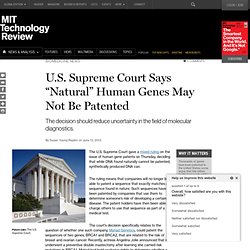
Supreme Court gave a mixed ruling on the issue of human gene patents on Thursday, deciding that while DNA found naturally cannot be patented, synthetically produced DNA can. The ruling means that companies will no longer be able to patent a sequence that exactly matches a sequence found in nature. Such sequences have been patented by companies that use them to determine someone’s risk of developing a certain disease. The patent holders have then been able to charge others to use that sequence as part of a medical test. The court’s decision specifically relates to the question of whether one such company, Myriad Genetics, could patent the sequences of two genes, BRCA1 and BRCA2, that are related to the risk of breast and ovarian cancer.
Killing Gene Patents Could Revitalize Biotech. China Could Supplant U.S. as the Supercomputing Superpower. China’s Tihane-2, the world’s top supercomputer.
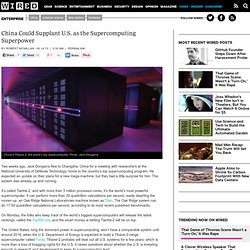
20 inventions qui verront le jour d'ici 2050 : 20 innovations qui vont bouleverser l'économie d'ici 2050. La géolocalisation indoor. XEnvoyer cet article par e-mail La géolocalisation indoor.
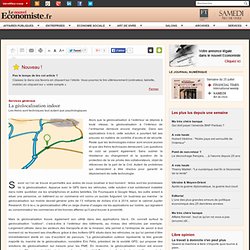
Real-Life True Blood: Synthetic Blood Is Coming — And So Are a Host of Potential Complications. Image: HBO Season 6 of HBO’s vampire drama True Blood premieres on Sunday night, presumably following up on last year’s cliffhanger where the factory that produces Tru-Blood — the bottled synthetic blood that allows vampires go “vegetarian” — was burned to the ground, destroying the product that made it possible for vampires to non-violently co-exist with people.

But out here in the real world, the future of synthetic blood is just beginning. After decades of global research, controversies, and failed approval petitions, the UK’s Medical and Healthcare products Regulatory Agency finally gave researchers at the Scottish Centre for Regenerative Medicine the go-ahead late last month to start developing synthetic blood with adult stem cells. Un logiciel de réalité augmentée pour réduire les problèmes de maintenance et les coûts. L'un des plus grands complexes hôteliers Australiens, Crown, se met à la réalité augmentée pour améliorer ses performances et coûts liés à la maintenance, en utilisant la plateforme d'IBM Maximo.
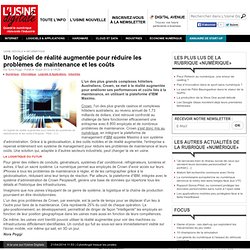
Crown, l'un des plus grands casinos et complexes hôteliers australiens, au revenu annuel de 1,73 milliards de dollars, s'est retrouvé confronté au challenge de faire fonctionner efficacement une entreprise avec 6 800 employés et de nombreux problèmes de maintenance. Quand le cerveau parle à l'ordinateur. "Pensez très fort à un objet et il sortira de notre imprimante 3 D.
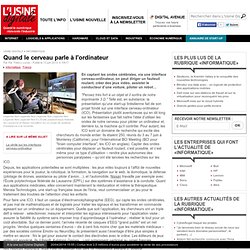
" Telle est, en substance, la présentation qu’une start-up brésilienne fait de son projet fondé sur une interface cerveau-ordinateur (ICO). Présentation plutôt aventureuse qui en dit long sur les fantasmes que fait naître l’idée d’utiliser les ondes de notre cerveau pour piloter un ordinateur et, derrière lui, la machine qu’il contrôle. Pour autant, les ICO sont un domaine de recherche qui excite des chercheurs du monde entier. Ils étaient 250, réunis du 3 au 7 juin à Monterey (Californie), pour l’International BCI Meeting (BCI pour "brain computer interface", les ICO en anglais). Capter des ondes cérébrales pour déplacer un fauteuil roulant, c’est possible, et c’est même pour ce type d’utilisation – rendre plus autonomes des personnes paralysées – qu’ont été lancées les recherches sur les ICO. Deux options possibles. From Argonne, a Bionic Eye. April / May 2013 By: Angela Hardin and Tona Kunz Volume 11 Number 2 The beginning of 2013 has seen a real leap forward for the market readiness of several technologies developed at Argonne National Laboratory.
The lab recently announced the approval of the first bionic eye for use in the United States.